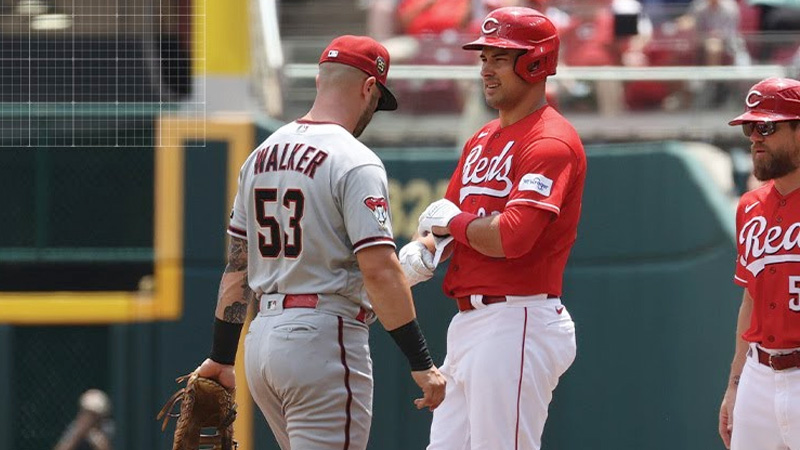The Arizona Diamondbacks, a Major League Baseball team based in Phoenix, has had its fair share of struggles in recent years.
Despite a promising start in the late 1990s and early 2000s, which saw them capture a World Series title in 2001, the franchise has been marred by a series of poor decisions and lackluster performances.
Wondering what is wrong with the Arizona Diamondbacks? In this article, we will delve into the issues that have plagued the Diamondbacks and explore the reasons behind their decline.
What Is Wrong with the Arizona Diamondbacks?
Below are the issues Arizona Diamondbacks are finding difficult to handle:
Inconsistent On-Field Performance
One of the primary problems afflicting the Diamondbacks is their inconsistent on-field performance. Since their World Series win in 2001, the team has made the playoffs only five times, with no postseason appearances since 2017.
In the intervening years, they have failed to establish a winning culture, often struggling to compete with more formidable opponents. Inefficiencies in player development, roster construction, and overall team strategy have contributed to this inconsistency.
Poor Front Office Decisions
A significant factor behind the Diamondbacks’ struggles can be attributed to questionable decisions made by their front office. Several high-profile trades and signings have failed to yield the desired results, resulting in wasted resources and diminished team performance.
One prime example is the trade of All-Star first baseman Paul Goldschmidt to the St. Louis Cardinals in 2018, which left a significant void in the team’s lineup and leadership.
Additionally, the Diamondbacks have made long-term commitments to players who have underperformed, hindering the team’s financial flexibility and ability to make necessary roster adjustments.
Ineffective Player Development
Another key issue is the Diamondbacks’ inability to consistently develop and retain talent. While the team has had success in producing impactful players like Goldschmidt and Ketel Marte, their farm system has often failed to deliver a consistent pipeline of talent.
The lack of depth in the minor leagues has put added pressure on the major league roster, leading to an overreliance on ageing veterans or unproven prospects.
Without a strong foundation of young, homegrown talent, the team has struggled to compete in a league that increasingly values youth and player development.
Pitching Woes
Pitching has been a persistent problem for the Diamondbacks. The team has struggled to acquire and develop reliable starting pitchers, leading to a rotation that lacks consistency and effectiveness.
While there have been bright spots like Zack Greinke during his time with the team, the overall quality of the pitching staff has been subpar. Furthermore, the bullpen has also been a weak point, often faltering in crucial situations and blowing leads.
The Diamondbacks must address their pitching deficiencies to have any chance of competing in the highly competitive National League West division.
Financial Constraints
Financial constraints have limited the Diamondbacks’ ability to invest in high-quality free agents and make necessary roster improvements.
The team’s payroll has been relatively modest compared to some of the league’s big spenders, which has hampered their competitiveness in the free-agent market.
History of the Arizona Diamondbacks

Source: calltothepen
The Arizona Diamondbacks, a Major League Baseball (MLB) franchise, began its history in 1998 when the league awarded an expansion team to the city of Phoenix, Arizona.
The team became the first major professional sports franchise based in the state. Let’s take a journey through the history of the Arizona Diamondbacks:
Inception and Early Years (1998-2000)
The Diamondbacks played their inaugural season in 1998, under the management of manager Buck Showalter.
In their first season, they set an MLB record for the most wins by an expansion team with 65. The team showcased a solid roster that included players like Jay Bell, Matt Williams, and Randy Johnson.
They continued to build upon their early success and made their first postseason appearance in 1999 but were eliminated in the National League Division Series (NLDS).
World Series Triumph (2001)
The Diamondbacks achieved their greatest milestone in 2001. With manager Bob Brenly at the helm, the team won the National League West division and advanced to the playoffs.
Led by dominant pitching from Randy Johnson and Curt Schilling, the Diamondbacks defeated the St. Louis Cardinals in the NLDS and the Atlanta Braves in the National League Championship Series (NLCS).
They then faced the highly favored New York Yankees in the World Series. In a dramatic and memorable series, the Diamondbacks rallied in the ninth inning of Game 7, with Luis Gonzalez hitting a walk-off single, securing their first and only World Series championship to date.
Post-World Series Years (2002-2010)
Following their World Series victory, the Diamondbacks experienced a period of relative inconsistency. Despite making the playoffs in 2002, they struggled to replicate their earlier success.
In 2004, the team hired manager Bob Melvin, and in subsequent years, they underwent a rebuilding phase, focusing on developing young talent.
Return to the Playoffs (2011-2017)
Under manager Kirk Gibson, the Diamondbacks saw a resurgence and made a return to the playoffs in 2011. Led by players such as Justin Upton, Paul Goldschmidt, and Ian Kennedy, they won the National League West division.
However, they were eliminated in the NLDS by the Milwaukee Brewers. The Diamondbacks had a strong regular season in 2012 but were once again eliminated in the playoffs.
Recent Years (2018-Present)
In recent years, the Diamondbacks have faced various challenges and have struggled to maintain consistent success. They made a significant trade in 2018, sending Paul Goldschmidt to the St. Louis Cardinals.
The team has undergone transitions in management and made efforts to rebuild the roster. However, they have not made the playoffs since 2017, and their performance has been marked by inconsistency.
Throughout their history, the Arizona Diamondbacks have had moments of success, including their memorable World Series triumph in 2001. However, the franchise has also faced periods of rebuilding and struggles.
As they move forward, the Diamondbacks will continue to strive for success and aim to bring another championship to the passionate fanbase in Arizona.
Arizona Diamondbacks Best Records
The Arizona Diamondbacks, since their inception in 1998, have had several successful seasons with impressive regular-season records. Here are some of the best records achieved by the Diamondbacks in their history:
1999: 100-62 (.617)
In just their second season, the Diamondbacks had a remarkable year, winning 100 games and clinching the National League West division title. Led by manager Buck Showalter, the team featured standout performances from players like Randy Johnson, Curt Schilling, and Luis Gonzalez.
2001: 92-70 (.568)
The 2001 season is widely considered the most successful in Diamondback’s history. The team won the National League West division and went on to win the World Series against the New York Yankees.
Led by managers Bob Brenly and Bob Melvin, the team had an impressive regular season and secured a playoff berth.
2002: 98-64 (.605)
In 2002, the Diamondbacks achieved their second-highest win total in a season. Under manager Bob Brenly, the team won the National League West division for the second time in franchise history. Although they were eliminated in the NLDS by the St. Louis Cardinals, it was a strong season for the Diamondbacks.
2007: 90-72 (.556)
Under the leadership of manager Bob Melvin, the Diamondbacks had a solid season in 2007. They won the National League West division title and advanced to the NLCS but were ultimately defeated by the Colorado Rockies.
2011: 94-68 (.580)
In 2011, under manager Kirk Gibson, the Diamondbacks had a strong regular season, winning the National League West division. Led by players like Justin Upton, Ian Kennedy, and Miguel Montero, the team showcased their potential.
Who Are the Most Notable Players in Arizona Diamondbacks?
The Arizona Diamondbacks have had several notable players throughout their history. Here are some of the most prominent players who have made significant contributions to the franchise:
Randy Johnson (1999-2004, 2007-2008)
Randy Johnson is one of the most dominant pitchers in MLB history. He had two stints with the Diamondbacks and was instrumental in their 2001 World Series championship.
Johnson won four consecutive Cy Young Awards from 1999 to 2002 while with the Diamondbacks, showcasing his remarkable talent and impact on the team.
Luis Gonzalez (1999-2006)
Luis Gonzalez is remembered for his iconic walk-off hit in Game 7 of the 2001 World Series. He played a crucial role in the success of the Diamondbacks during that championship year.
Gonzalez was a consistent offensive force, hitting for both power and average and earning five All-Star selections while with the team.
Paul Goldschmidt (2011-2018)
Paul Goldschmidt was one of the most beloved and accomplished players in Diamondback’s history. He spent eight seasons with the team, becoming a fan favorite and a symbol of excellence.
Goldschmidt was a six-time All-Star, earning four Silver Slugger Awards and three Gold Glove Awards. He consistently provided power, on-base skills, and stellar defense at first base.
Curt Schilling (2000-2003)
Curt Schilling formed a formidable duo with Randy Johnson as part of the Diamondbacks’ rotation. He played a crucial role in the team’s success, including their 2001 World Series championship.
Schilling earned three All-Star selections with the Diamondbacks and was known for his competitiveness and clutch performances in the postseason.
Brandon Webb (2003-2010)
Brandon Webb was a dominant starting pitcher for the Diamondbacks during his tenure. He won the National League Cy Young Award in 2006 and finished as a runner-up in 2007 and 2008.
Webb was known for his sinker, inducing ground balls and generating consistent success on the mound until injuries derailed his career.
Zack Greinke (2016-2019)
Zack Greinke joined the Diamondbacks as a high-profile free agent signing. He brought his exceptional pitching skills to the team and had several strong seasons in Arizona.
Greinke earned two All-Star selections with the Diamondbacks and won the 2017 Silver Slugger Award as the best-hitting pitcher in the National League.
Ketel Marte (2017-Present)
Ketel Marte has emerged as a versatile and impactful player for the Diamondbacks. He has showcased his skills both offensively and defensively, earning an All-Star selection in 2019.
FAQs
Has the Arizona Diamondbacks ever had success in recent years?
While the Arizona Diamondbacks experienced success in the late 1990s and early 2000s, winning the World Series in 2001, they have struggled to maintain consistent success in recent years.
What were some of the notable trades or signings that hindered the Diamondbacks?
One notable trade that affected the Diamondbacks was the departure of All-Star first baseman Paul Goldschmidt in 2018. The team traded Goldschmidt to the St. Louis Cardinals, which left a significant void in their lineup and leadership.
What steps is the Diamondbacks organization taking to address their player development issues?
The Diamondbacks have made efforts to address their player development issues by investing in their minor league system and focusing on scouting and player development strategies. They have made changes to their coaching and development staff, aiming to improve the development of young talent.
How have the Diamondbacks addressed their pitching woes?
The Diamondbacks have made efforts to address their pitching issues through various means. They have made trades and signings to acquire starting pitchers, although the success of these acquisitions has been mixed.
Are the financial constraints impacting the Diamondbacks likely to change?
The financial constraints faced by the Diamondbacks are influenced by various factors, including market size, revenue streams, and ownership priorities. While it is challenging to predict specific changes in the team’s financial situation, the organization’s willingness to invest in the roster.
Bottom Line
That was all about what is wrong with the Arizona Diamondbacks. The Arizona Diamondbacks find themselves in a challenging position, struggling to compete in a highly competitive league due to a combination of on-field inconsistency, poor front-office decisions, ineffective player development, pitching woes, and financial constraints.
To reverse their fortunes, the Diamondbacks need to make astute personnel decisions, focus on player development, and invest wisely in their roster. Only by addressing these issues can the team hope to reclaim their former glory and provide their loyal fanbase with a team worth supporting.







